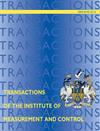利用增广Lyapunov–Krasovskii泛函改进不确定混沌Lur’e系统的主从鲁棒同步准则
IF 1.7
4区 计算机科学
Q3 AUTOMATION & CONTROL SYSTEMS
Transactions of the Institute of Measurement and Control
Pub Date : 2023-08-18
DOI:10.1177/01423312231188174
引用次数: 0
摘要
进一步研究了基于时滞反馈控制的不确定主从Lur’e系统的鲁棒同步问题。利用李雅普诺夫稳定性理论,提出了一个不太保守的同步稳定性准则和一个不那么保守的鲁棒同步稳定性准则。首先,构造了一个增广的延迟相关李雅普诺夫-克拉索夫斯基泛函(LKF),其中一些单积分项被增广为单积分子函数的被积函数分量。这不仅增加了一些系统变量上的耦合信息,而且增加了不等式引理中包含的一些必要变量上的耦联信息,可以充分利用不等式引理,降低同步稳定性准则的保守性。其次,为了克服同步准则中的非线性现象,利用新的负定不等式等价变换引理,将非线性不等式等价变换为线性矩阵不等式,这可以很容易地用MATLAB LMI工具箱求解。最后,通过一些常见的数值算例验证了该方法的有效性。本文章由计算机程序翻译,如有差异,请以英文原文为准。
Improvement master–slave robustly synchronous criteria of uncertain chaotic Lur’e systems via an augmented Lyapunov–Krasovskii functional
The robust synchronization of uncertain master–slave Lur’e systems based on time-delayed feedback control is further investigated. A less conservative synchronization stability criterion and a less conservative robust synchronization stability criterion than some recent published references are proposed via Lyapunov stability theory. First, an augmented delay-dependent Lyapunov–Krasovskii functional (LKF) is constructed, where some single integral terms are augmented to the integrand component of a single-integral subfunction. This not only increases some coupling information on some system variables but also increases the coupling information on some necessary variables contained in the inequality lemmas, which can make full use of the inequality lemmas and reduce the conservatism of the synchronization stability criterion. Second, to overcome the nonlinear phenomena in the synchronization criterion, the novel negative definite inequality equivalent transformation lemma is used to transform the nonlinear inequalities to the linear matrix inequalities (LMIs) equivalently, which can be easily solved by the MATLAB LMI-Toolbox. Finally, some common numerical examples are presented to show the effectiveness of the proposed approach.
求助全文
通过发布文献求助,成功后即可免费获取论文全文。
去求助
来源期刊
CiteScore
4.10
自引率
16.70%
发文量
203
审稿时长
3.4 months
期刊介绍:
Transactions of the Institute of Measurement and Control is a fully peer-reviewed international journal. The journal covers all areas of applications in instrumentation and control. Its scope encompasses cutting-edge research and development, education and industrial applications.

 求助内容:
求助内容: 应助结果提醒方式:
应助结果提醒方式:


